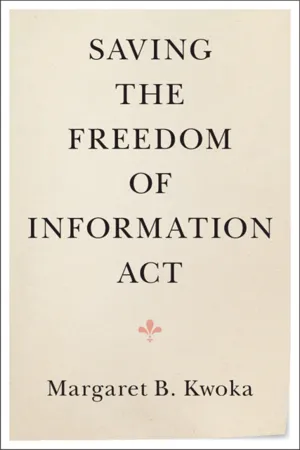
- English
- PDF
- Available on iOS & Android
Saving the Freedom of Information Act
About this book
Enacted in 1966, The Freedom of Information Act (or FOIA) was designed to promote oversight of governmental activities, under the notion that most users would be journalists. Today, however, FOIA is largely used for purposes other than fostering democratic accountability. Instead, most requesters are either individuals seeking their own files, businesses using FOIA as part of commercial enterprises, or others with idiosyncratic purposes like political opposition research. In this sweeping, empirical study, Margaret Kwoka documents how agencies have responded to the large volume of non-oversight requesters by creating new processes, systems, and specialists, which in turn has had a deleterious impact on journalists and the media. To address this problem, Kwoka proposes a series of structural solutions aimed at shrinking FOIA to re-center its oversight purposes.
Frequently asked questions
- Essential is ideal for learners and professionals who enjoy exploring a wide range of subjects. Access the Essential Library with 800,000+ trusted titles and best-sellers across business, personal growth, and the humanities. Includes unlimited reading time and Standard Read Aloud voice.
- Complete: Perfect for advanced learners and researchers needing full, unrestricted access. Unlock 1.4M+ books across hundreds of subjects, including academic and specialized titles. The Complete Plan also includes advanced features like Premium Read Aloud and Research Assistant.
Please note we cannot support devices running on iOS 13 and Android 7 or earlier. Learn more about using the app.
Information
Table of contents
- Cover
- Half-title
- Title page
- Copyright information
- Dedication
- Contents
- Acknowledgements
- Introduction
- Part I FOIA And Democracy
- Part II Who Makes a Million FOIA Requests
- Part III Let Oversight Reign
- Conclusion
- Appendices
- Index